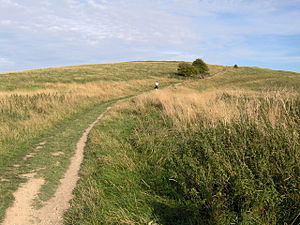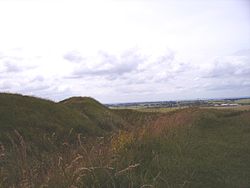Barbury Hill: Difference between revisions
Created page with '{{Infobox hill |name=Barbury Hill |county=Wiltshire |range=Marlborough Downs |picture=Looking up the Ridgeway towards Barbury Castle - geograph.org.uk - 239597.jpg |picture capti…' |
No edit summary |
||
| Line 4: | Line 4: | ||
|range=Marlborough Downs | |range=Marlborough Downs | ||
|picture=Looking up the Ridgeway towards Barbury Castle - geograph.org.uk - 239597.jpg | |picture=Looking up the Ridgeway towards Barbury Castle - geograph.org.uk - 239597.jpg | ||
|picture caption= | |picture caption=Looking up the Ridgeway towards Barbury Castle | ||
|os grid ref= SU149762 | |os grid ref= SU149762 | ||
|height= | |latitude=51.484559 | ||
|longitude=-1.786812 | |||
|height=870 ft | |||
}} | }} | ||
'''Barbury Hill''' in [[Wiltshire]] stands at the northern edge of the [[Marlborough Downs]], five miles south of [[Swindon]]. It has been managed as a country park by Swindon council since 1971. The hill is best known for Barbury Castle, the Iron Age hill fort which crowns its summit. | '''Barbury Hill''' in [[Wiltshire]] stands at the northern edge of the [[Marlborough Downs]], five miles south of [[Swindon]]. It has been managed as a country park by Swindon council since 1971. The hill is best known for Barbury Castle, the Iron Age hill fort which crowns its summit. | ||
| Line 14: | Line 16: | ||
'''Barbury Castle''' is an Iron Age hill fort on Barbury Hill; one of several such forts found along the ancient [[the Ridgeway|Ridgeway]] route. This is a local vantage point, which, under ideal weather conditions, commands a view across to the [[Cotswolds]] and the [[River Severn]]. | '''Barbury Castle''' is an Iron Age hill fort on Barbury Hill; one of several such forts found along the ancient [[the Ridgeway|Ridgeway]] route. This is a local vantage point, which, under ideal weather conditions, commands a view across to the [[Cotswolds]] and the [[River Severn]]. | ||
The fort has two deep defensive ditches and ramparts. The Old Ridgeway runs close by and the modern Ridgeway National Trail crosses through the castle. In the surrounding area are to be found round barrows, Celtic field systems and 18th-19th | The fort has two deep defensive ditches and ramparts. The Old Ridgeway runs close by and the modern Ridgeway National Trail crosses through the castle. In the surrounding area are to be found round barrows, Celtic field systems and 18th- to 19th-century flint workings.<ref name="swindon">http://www.swindon.gov.uk/leisuresport/parksandgardens/barbury.htm Swindon Borough Council website</ref> | ||
==History== | ==History== | ||
The site was first occupied some | The site was first occupied some 2,500 years ago, and was then in use during the Roman occupation of the area. Archaeological investigations at Barbury have shown evidence of a number of buildings, indicating a village or military garrison at this time. | ||
In the 6th century, the [[Wessex|West Saxons]] defeated the native Britons at the Battle of ''Beranburg'', ''Beran Byrig'' or ''Beranbyrig'', 556, and it is argued that this ''Beranburg'' is Barbury Hill, and the battlefield just north of the castle.<ref>{{cite journal |last=Leeds |first=E.T. |year=1954 |title=The Growth of Wessex |journal=Oxoniensia |volume=LIX |page=56 |publisher=Oxfordshire Architectural and Historical Society|Oxford Architectural and Historical Society |url=http://oxoniensia.org/oxo_volume.php?vol=59 |accessdate=6 October 2011}}</ref> | In the 6th century, the [[Wessex|West Saxons]] defeated the native Britons at the Battle of ''Beranburg'', ''Beran Byrig'' or ''Beranbyrig'', 556, and it is argued that this ''Beranburg'' is Barbury Hill, and the battlefield just north of the castle.<ref>{{cite journal |last=Leeds |first=E.T. |year=1954 |title=The Growth of Wessex |journal=Oxoniensia |volume=LIX |page=56 |publisher=Oxfordshire Architectural and Historical Society|Oxford Architectural and Historical Society |url=http://oxoniensia.org/oxo_volume.php?vol=59 |accessdate=6 October 2011}}</ref> | ||
| Line 24: | Line 26: | ||
[[File:Barbury Castle - Iron Age house building.JPG|thumb|220px|left|Iron Age house under construction - July 2006]] | [[File:Barbury Castle - Iron Age house building.JPG|thumb|220px|left|Iron Age house under construction - July 2006]] | ||
In Second World War the War Ministry appropriated the site for US Army Air Force anti-aircraft guns; the bases for these are apparently visible as hollows around the edge of the fort interior.<ref name="TMA">[http://www.themodernantiquarian.com/site/2617/barbury_castle.html The Modern Antiquarian: Barbury Castle]</ref> | In Second World War the War Ministry appropriated the site for US Army Air Force anti-aircraft guns; the bases for these are apparently visible as hollows around the edge of the fort interior.<ref name="TMA">[http://www.themodernantiquarian.com/site/2617/barbury_castle.html The Modern Antiquarian: Barbury Castle]</ref> | ||
Latest revision as of 09:36, 21 September 2018
| Barbury Hill | |||
| Wiltshire | |||
|---|---|---|---|
 Looking up the Ridgeway towards Barbury Castle | |||
| Range: | Marlborough Downs | ||
| Summit: | 870 ft SU149762 51°29’4"N, 1°47’13"W | ||
Barbury Hill in Wiltshire stands at the northern edge of the Marlborough Downs, five miles south of Swindon. It has been managed as a country park by Swindon council since 1971. The hill is best known for Barbury Castle, the Iron Age hill fort which crowns its summit.
Barbury Castle

Barbury Castle is an Iron Age hill fort on Barbury Hill; one of several such forts found along the ancient Ridgeway route. This is a local vantage point, which, under ideal weather conditions, commands a view across to the Cotswolds and the River Severn.
The fort has two deep defensive ditches and ramparts. The Old Ridgeway runs close by and the modern Ridgeway National Trail crosses through the castle. In the surrounding area are to be found round barrows, Celtic field systems and 18th- to 19th-century flint workings.[1]
History
The site was first occupied some 2,500 years ago, and was then in use during the Roman occupation of the area. Archaeological investigations at Barbury have shown evidence of a number of buildings, indicating a village or military garrison at this time.
In the 6th century, the West Saxons defeated the native Britons at the Battle of Beranburg, Beran Byrig or Beranbyrig, 556, and it is argued that this Beranburg is Barbury Hill, and the battlefield just north of the castle.[2]
Centuries later, the hill and its fort were a favourite haunt of the 19th century writer Richard Jefferies, who lived an hour's walk away at Coate.[1]

In Second World War the War Ministry appropriated the site for US Army Air Force anti-aircraft guns; the bases for these are apparently visible as hollows around the edge of the fort interior.[3]
In 1996 a geophysical survey revealed traces of 40 hut circles inside the castle.[3] A reconstruction of an Iron Age roundhouse was built on the site in 2006 but was destroyed by vandals in October 2008.
Ascent


The hill is in the northern part of the Marlborough Downs. There are no villages on its slopes.
By road the site can only approached by a single road ascending the scarp slope of the downs from midway along the B4005 between Wroughton and Chiseldon.
More options are available by foot or horseback, including the Ridgeway, which runs east – west along the edge of the downs, and a byway south across the downs to Marlborough.
Outside links
| ("Wikimedia Commons" has material about Barbury Hill) |
References
- ↑ 1.0 1.1 http://www.swindon.gov.uk/leisuresport/parksandgardens/barbury.htm Swindon Borough Council website
- ↑ Leeds, E.T. (1954). "The Growth of Wessex". Oxoniensia (Oxfordshire Architectural and Historical Society) LIX: 56. http://oxoniensia.org/oxo_volume.php?vol=59. Retrieved 6 October 2011.
- ↑ 3.0 3.1 The Modern Antiquarian: Barbury Castle
